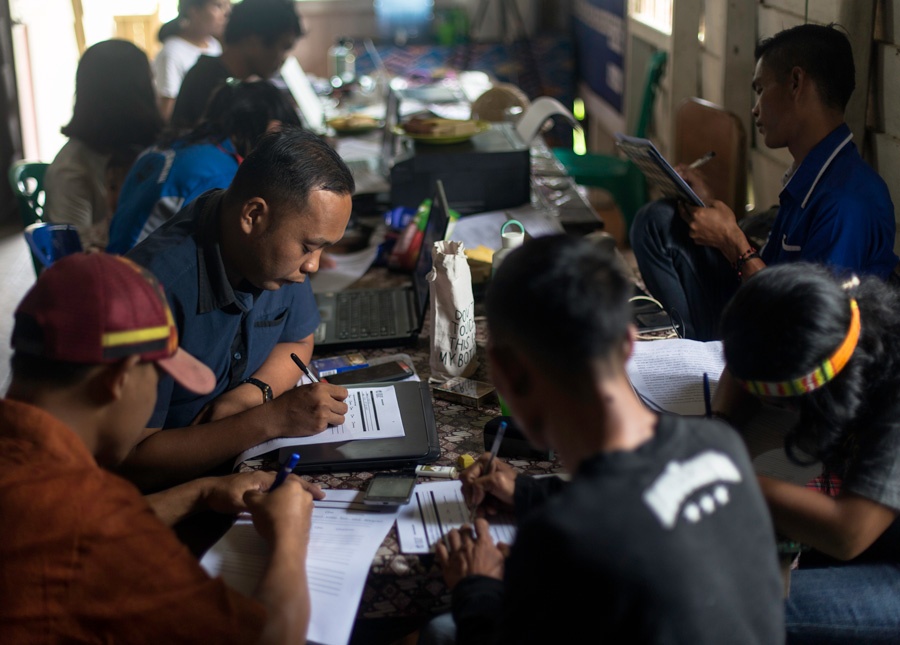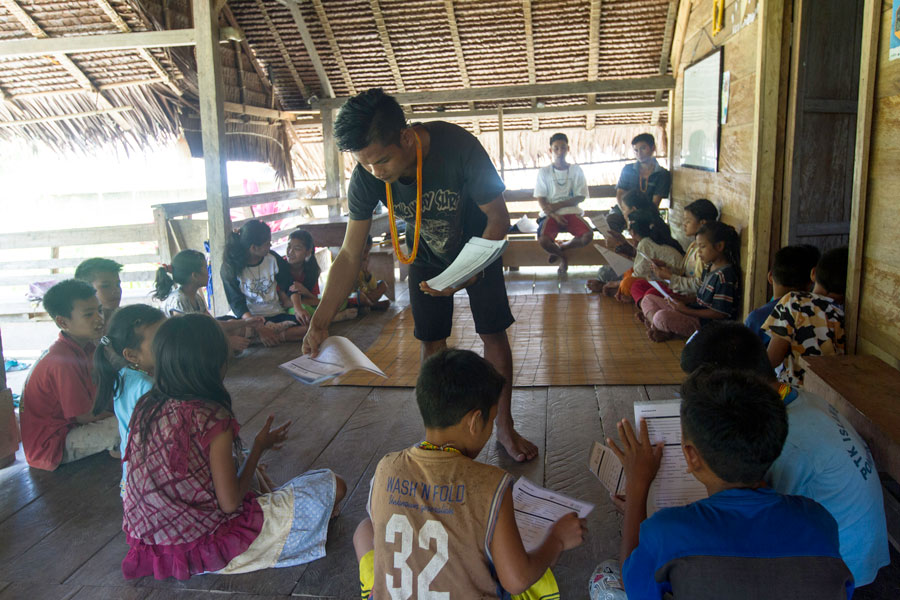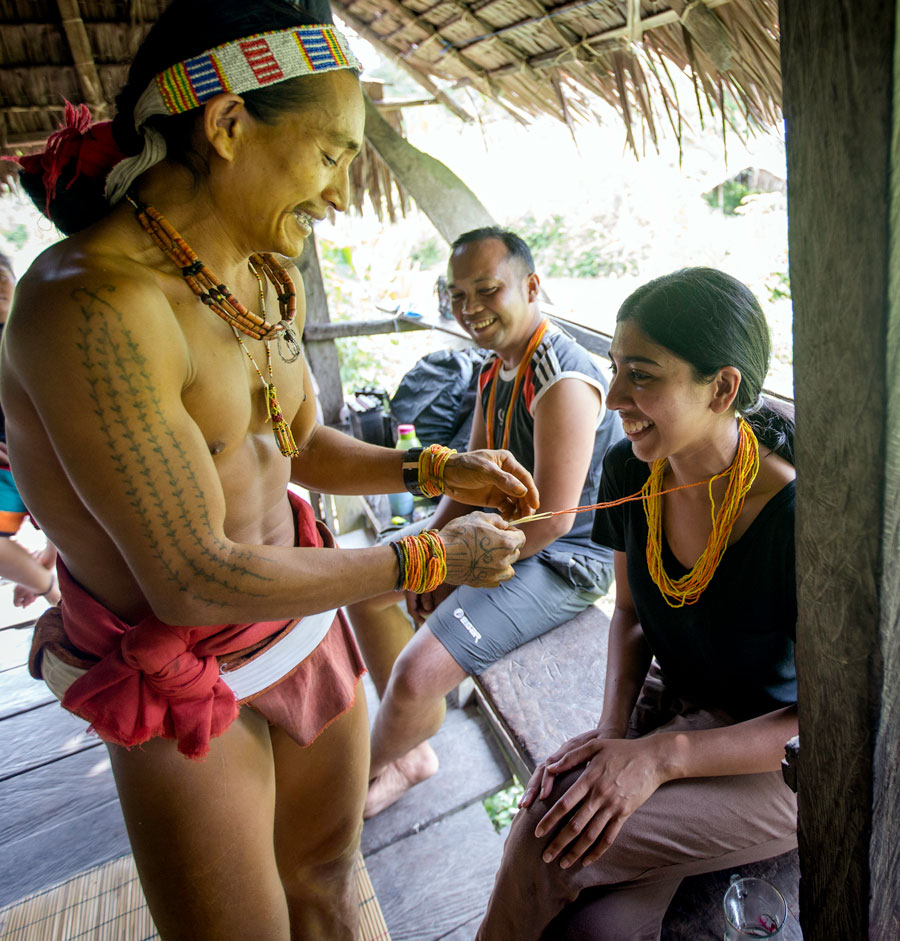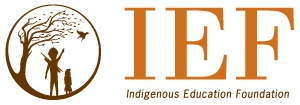MONASH POSTGRADUATE EXECUTES MON-EV STRATEGY TO REVEAL IEF PARTNER PROGRAM POSITIVELY INFLUENCING MENTAWAI’S INDIGENOUS YOUTH
In 2019, our partner Yayasan Pendidikan Budaya Mentawai (YPBM) engaged consultation with IEF to explore opportunities in opening their office doors to Australian University students to gain mutual learning and program strengthening outcomes. Late 2019, Monash University postgraduate Nipuni Bandaranayaka joined IEF on-ground in Mentawai as a part of her Work Integrated Learning program within the Master of International Development Practice.
Alongside IEF Operations Manager, Samantha Lee, and YPBM Chairman, Fransiskus Yan, Nipuni made critical developments in IEF’s on-going Monitoring and Evaluation strategy (MON-EV). Results from IEF’s MON-EV reveal significant impact is being made in Mentawai, with all staff members agreeing that partnering with IEF has given them greater opportunity to gain new skills and knowledge that they might not have had access to otherwise. Students and teachers are enthusiastic to be learning about their indigenous culture, and agree that IEF’s Mentawai partner program is contributing positively to the community’s improved livelihood and wellbeing.
Last month we sat down (virtually) with Nipuni to reflect on her experiences:
Sam: Firstly, why did you choose to intern with IEF?
Nipuni: I knew that I wanted to carry out an overseas internship and be able to practically apply some of the theory learnt during my International Development course at uni. IEF’s partnership with YPBM in Indonesia seemed perfect to get involved with and IEF were able to accommodate for my interests and make sure the work I did during the placement aligned with my studies.
I had the opportunity to experience what an integrated work environment looked like within a young, grassroots organisation and witness the complexities of working within a specific cultural context. I felt I gained a unique experience because IEF works literally alongside their partner organisation and I was privy to the decision-making processes which had an immediate and direct impact on their program work. I was looking for an opportunity to critically evaluate whether the theory I had learnt had practical value and to identify the challenges of working in-country; my internship with IEF enabled me to do this.

YPBM staff members taking part in IEF’s annual partner program survey. Since working with IEF, all staff members report feeling more connected to their indigenous identity, more connected to their local community, and more confident participating in community decision-making processes. October 2019. Photo: Rob Henry
Sam: You mentioned that most of your knowledge gained whilst studying at Monash was largely theoretical. But, most of your interning duties were practical, on-ground action. What impact do you feel your theoretical understandings have on the Mentawai program and IEF’s MON-EV activities?
Nipuni: I am extremely lucky that the timing of my placement coincided with IEF’s MON-EV period, as I had completed a unit on the same topic and was eager to apply the theory learnt.
This theoretical background helped in ensuring the MON-EV processes carried out with IEF met international standards and followed ethical guidelines. Applying some of those theoretical tools to the process of developing indicators revealed some gaps in the link between IEF targets and program activities. This prompted a more in-depth discussion with Sam and provided a valuable opportunity for me to work on developing more detailed indicators on how the progress towards IEF targets would be measured, which in turn gave us a clearer vision for the rest of our MON-EV activities.
The results from the MON-EV activities will have hopefully identified any other areas and gaps that needed to be addressed to improve the Mentawai program and provided a base on which IEF’s future work could expand on.
Sam: We were working very closely with the Mentawai team – in the office every day, even sharing meals! What impact did working so close with YPBM have on your interning experience? Did you feel that this was important?
Nipuni: One of my goals was to gain experience in developing a monitoring and evaluation strategy and apply theory learnt during studies. As this required familiarising myself with the Mentawai context, working alongside the YPBM staff in their office was the ideal environment to make these observations and I was able to make the most of an immersive learning experience.
Before my internship, I also only had experience working in the head-quarters of a large NGO in Australia. It was, therefore, an important personal learning objective for me to discover what it was like to work in-country with a small Not-For-Profit such as IEF. It was in this context that I was also able to observe how capacity-building and decision-making occurred between partner organisations and where I learnt the importance of a program that was culturally specific.

Sam: How has your involvement with the Mentawai program shaped your perspectives of advancing education equity for indigenous peoples?
Nipuni: Education equity is an essential aspect of any education system and is especially important in societies where Indigenous peoples are marginalised. Through my internship with IEF, I have gained a deep appreciation for the importance of education equity, as it plays a pivotal role in empowering individuals and communities to embrace their Indigenous heritage. Students remain connected to their cultural roots when they learn about their heritage. It forms an essential part of their identity and is something that can be carried with them throughout the rest of their lives.
Sam: How have your experiences at Indigenous Education Foundation (IEF) changed your future?
Nipuni: In terms of career development; through my internship with IEF, I’ve been able to gain invaluable practice in monitoring and evaluation, grant writing and report writing. These experiences are hard to come by and are valuable because many workplaces require relevant experience to be considered for a position. Additionally, I’ve been able to augment my interpersonal and intercultural communication skills; important for both personal and professional development.
I feel I have gained a better understanding of the ‘field experience’ so often referred to within the International Development sector and am more confident that the skills gained will aid in working ‘within-country’ if the opportunity ever arose again.
On a more personal and reflective note, this experience is not one that I can quantify into soft and hard skills, I cherish the human connections built and I will be drawing on the lessons learned for years to come. Though brief, I’ve been humbled by the time I’ve spent with the incredible IEF team, and of course the Mentawai people themselves, who have left me with a lasting impression.

Monash postgraduate student Nipuni Bandaranayaka participating in a Mentawai ceremony. In this photo, Sikerei Aman Sasali offers a cultural and spiritual blessing to help protect Nipuni whilst in Mentawai. November 2019. Photo: Rob Henry



0 Comments